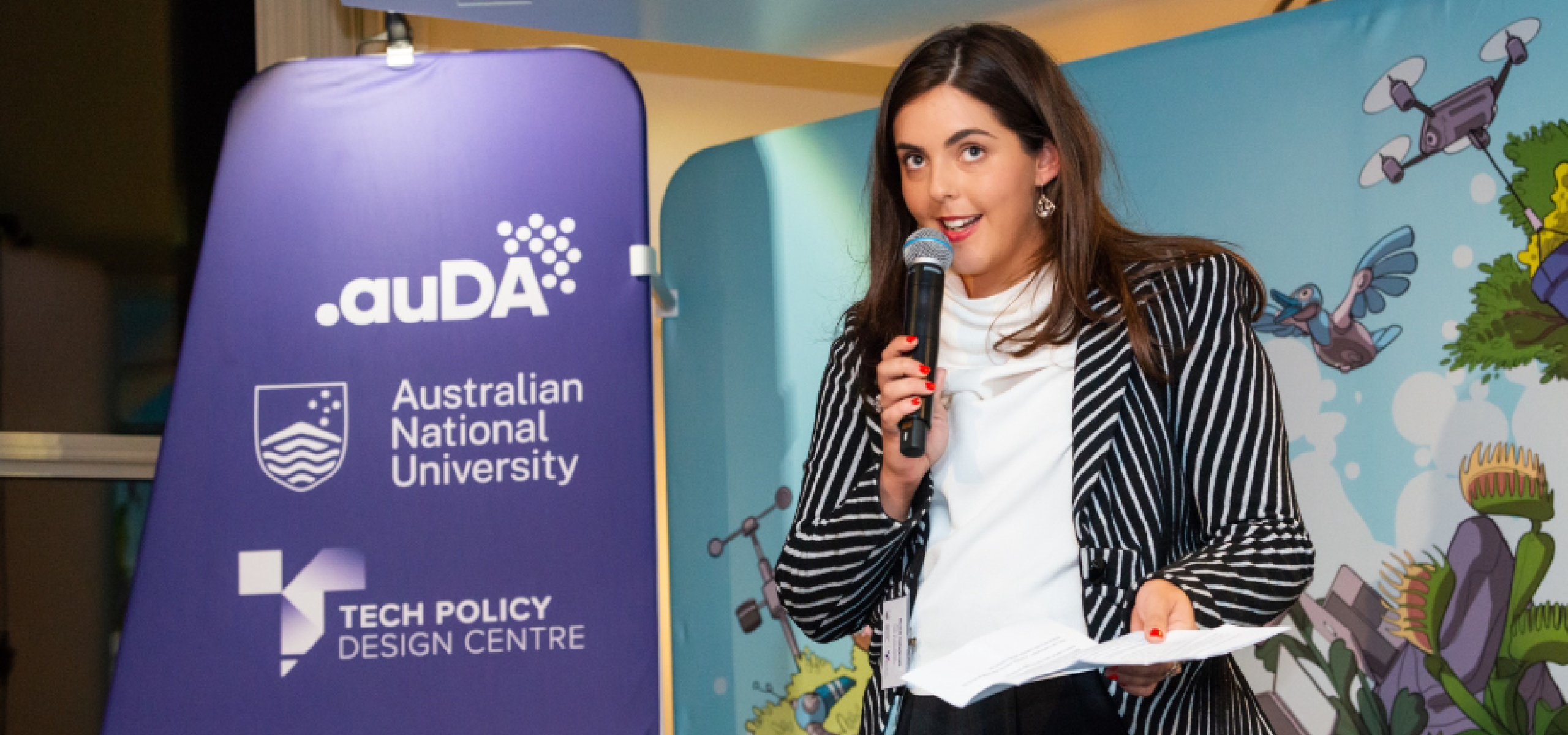
Alice Dawkins sharing insights on best-practice tech regulation at the Tech Policy Futures night at Parliament House hosted by the Tech Policy Design Centre. Image supplied.
I am excited about this work because, alongside the climate movement, it is a defining challenge of our generation. The laws and policies we are helping to shape are the fundamental building blocks for a healthy, digitally-powered democracy.
Studying law was a natural choice for Alice Dawkins (BAsSt (Hons) ’16, LLB (Hons) ’18). Arriving at The Australian National University (ANU) on a Hawker Scholarship, she was attracted to the College of Law’s lively public policy environment. Although discouraged by the drier parts of a legal education and regularly considering dropping out, Alice persevered because she knew that law would be a necessary part in her journey towards making a difference in society.
After building up a diverse career both in research and startup-style organisations, Alice recently took on the challenge of Executive Director for the Australian operations of Reset.Tech, a global policy initiative taking on Big Tech's dominance. Alice’s team work with British, European, and American partners to ensure tech and internet companies operate in an environment of transparency and accountability.
“In every other industry, we expect fair markets, safe products, and proactive risk mitigation”, Alice shares.
“Tech companies have rather successfully relied on arguments of exceptionalism and economic scare tactics to avoid independent oversight and genuine accountability. We play a bit of a role pushing back on that.”
“I am excited about this work because, alongside the climate movement, it is a defining challenge of our generation,” she continues.
“The laws and policies we are helping to shape are the fundamental building blocks for a healthy, digitally-powered democracy.”
Working to effect change is nothing new for Alice. Throughout her career, she has worked with various organisations in different capacities – most recently, she worked at the Minderoo Foundation to establish their technology policy program, and held an appointment at the University of California, Los Angeles (UCLA) Center for Critical Internet Inquiry as a Global Policy Fellow.
She admits that this course was not by design. Alice credits her time at the ANU College of Law for setting up her career through unique opportunities such as spending a year in Myanmar as part of her thesis research. It was there that she profiled the young generation of pro-democracy lawyers and lectured in political science at the University of Yangon under the New Colombo Plan scholarship.
This experience, she says, served as an accidental introduction to Big Tech accountability.
“One of my research methods was digital ethnography so I spent a lot of time browsing Burmese-language Facebook groups and pages. It was a dramatically different experience to Australian Facebook products,” she recalls.
“There was virtually no content moderation, and no discernible cautionary investments from Facebook for the unique situation of a young democracy with a rapid uptake of online exposure and connectivity.”
What she experienced and observed served as a prelude to some of the major events that would happen in the country later in her program; the world witnessed brutal military ‘clearance’ operations in the northern Rakhine State and, a few years later, the elected democratic government was violently deposed.
As Alice takes on the challenge of her new role at Reset.Tech, she is excited about the ambition of the work and how it will positively impact future generations. She hopes that in this role, she can build greater awareness of the tech accountability movement, and expand the opportunities for graduates in civil society.
“When I was weighing up career options at the end of my undergraduate degree, there was a lot of hype around taking policy roles in tech companies. Back then, those roles were coded as nimble public interest efforts for democratic outcomes,” she says.
“That romance is pretty much over. I feel that the bulk of true public-interest tech policy work goes on in lively parts of civil society and the public sector – in areas like competition policy, industrial policy, consumer protection, data protection, and online safety. The right side of history can be a lonely place, but the party’s getting larger every day.”
Looking ahead in her career, Alice reflects with fondness on her time at ANU, expressing the opportunities and her experiences as an undergraduate as genuinely world-class. She deeply values the lessons she learned at ANU and in other parts of her career journey, and believes these will be integral as she sets to make her biggest impact yet.
“The lessons I’ve learned from my most grueling projects have been lessons of patience, humility, and constant refinement. Extracting real change from political environments takes endurance and resilience. And you must always remember how lucky you are to be there. It is a privilege to take on hard issues in troubled times,” she says.